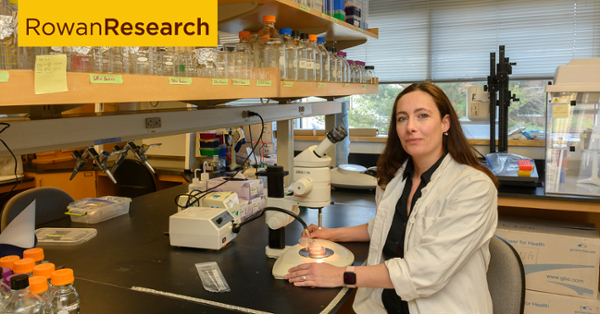Investigating gut microbes in honey bees
Investigating gut microbes in honey bees

Svjetlana “Lana” Vojvodic Kruse, Ph.D., has spent her lifetime fascinated by honey bees. As a faculty researcher in Rowan University’s Department of Biological Sciences, she’s investigating the importance of gut bacteria on bee behavior and genetics.
“Until recently, we did not know that gut microbes have a larger function that goes beyond food digestion and activating the host’s immune system,” Vojvodic Kruse said. “With some experimental creativity, my students and I have been able to show that gut microbial communities can impact individual learning and social interactions in honey bees.”
Svjetlana 'Lana' Vojvodic Kruse, Ph.D.
BiologistAreas of expertise: Gut microbiome, host-parasite interactions, behavior, social insects
More information
Her research team manipulates the bee gut microbes in the lab and tests the bees’ ability to associate odor with a sugar reward. The bees’ social network is recorded on video to track changes in their social structures and interactions. Watch more about the Vojvodic Kruse Social Insect Lab.
Honey bees are one of the most complex social organisms besides humans—and they’re smart. Thousands of individuals live together, learning, communicating and working as a community to find food, care for their young and respond to diseases.
Vojvodic Kruse’s research indicates honey bees learn better if their guts contain a particular strain of bacteria. That’s a clear link that a bee’s microbiome—good bacteria in the gut—somehow contributes to memory or learning. She’s also exploring which genes in their brains are tied to behavioral changes.
Understanding how the honey bee interacts with its symbiotic gut bacteria could lead to better honey bee management and practices. Vojvodic Kruse’s work might also lead to better understanding how human gut bacteria impacts our biology, too.
“We are definitely trying to improve bee health, but it’s a very unique study system that can be used to also look at how the gut microbiome potentially mechanistically influences learning and gene expression in the brain,” Vojvodic Kruse said. “This could potentially translate to other organisms including humans.”
Rowan University researchers are passionate about what they do. Find more at Meet Our Researchers.